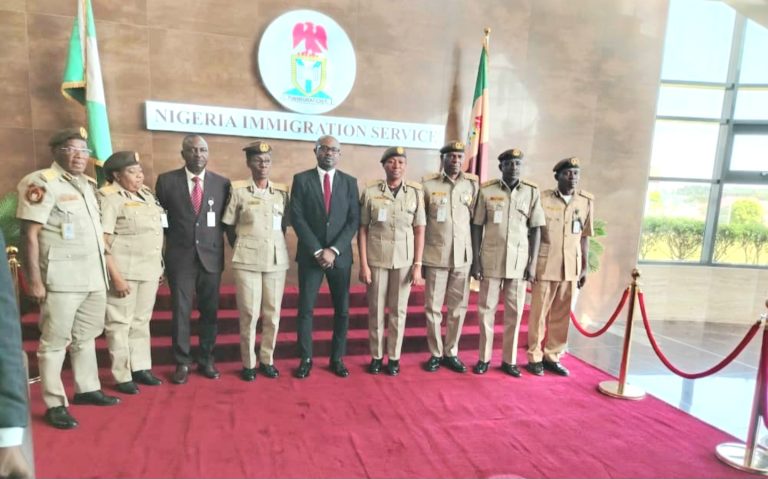By Ibironke Ariyo
The Federal Government of Nigeria has inducted no fewer than 123 officers into the Command and Control Centre facility at the Nigeria Immigration Service (NIS) to reinforce the country’s border control, security, and governance capabilities.
Speaking at the inauguration ceremony on Monday in Abuja, the Minister of Interior, Dr. Olubunmi Tunji-Ojo, said the strategic move was aimed at enhancing national security and streamlining operations at the NIS.
Tunji-Ojo said the centre’s infrastructure and facilities have been fully integrated with those of the International Police (Interpol) and other security forces around the world.
This, he said, would involve pre-profiling passengers and searching for persons of interest anywhere in the world.
“Persons of interest would be picked up from anywhere before they even board their flights to Nigeria as the facilities here have the capacity and capability to pre-profile passengers,” he stressed.
The minister said the command and control centre will operate 24 hours a day, seven days a week to monitor the country’s land, sea and air borders.
He said Nigeria does not have the luxury that other countries in Africa have, given its geographical location in 10 countries of the Sahel and the Gulf of Guinea in the south, where about 5 million barrels of crude oil are produced per day.
Tunji-Ojo said that with the commissioning of the centre, the NIS has gone beyond providing travel documents to its citizens.
“The NIS is now fully integrated into Nigeria’s security architecture and plays a dominant role. This service now constitutes a crucial element of Nigeria’s national security architecture.
“Here we have the NIS determined to take responsibility. Nigeria’s security now depends on you, especially given the infrastructure and facilities in place at the command and control centre.
“These facilities provide data to the Advanced Passenger Information System (APIS). This means that no one should come to Nigeria without first creating a profile. We then have this possibility of irregular migration and real-time analysis of passenger traffic.
“I am ready to do everything possible for Nigeria to ensure that the system works effectively and efficiently. I also urge you to do your best as the first group of officials to operate these facilities across the country.
“There will be no room for error and we have organized the system in such a way that the agents who will be deployed at each point do not get tired so they can do their work without problems,” he explained.
Tunji-Ojo, however, said President Bola Tinubu will soon inaugurate new electronic passenger gates (E-Gates) at Lagos and Abuja airports respectively.
In his speech, NIS Auditor General Kemi Nandap said that around 253 personnel have been selected to undergo special training in command and control center infrastructure management.
However, Nandap said the first batch of 123 officers consisted of representatives from various commands across the country.
Nandap, who termed the induction as a special day in the history of NIS, said officers who passed the first phase of training would move on to the next phase, which includes data analysis and action planning.
“This training was not a normal training, it was conducted in collaboration with many important stakeholders and it will be in your interest to pioneer the flagship project that NIS has launched.
“I appeal to you to take responsibility because the success of this unit is of utmost importance for the national security of our country.
“That’s why he has a lot of responsibility now. He must justify the trust placed in him and ensure that the tasks assigned to him are not compromised,” he said.
The NIS CG said the Advanced Passenger Information System (APIS) would revolutionize the agency’s ability to detect potential security threats.
He said this could be achieved by leveraging data from multiple sources, adding that APIS allowed the NIS to track relevant individuals and preemptively mitigate potential threats to the country.
The News Agency of Nigeria (NAN) reports that APIS facilitates the collection and analysis of passenger data, enabling real-time risk assessment and targeted interventions.
This proactive approach strengthens national security and enhances the ability of the NIS to secure Nigeria’s borders.




